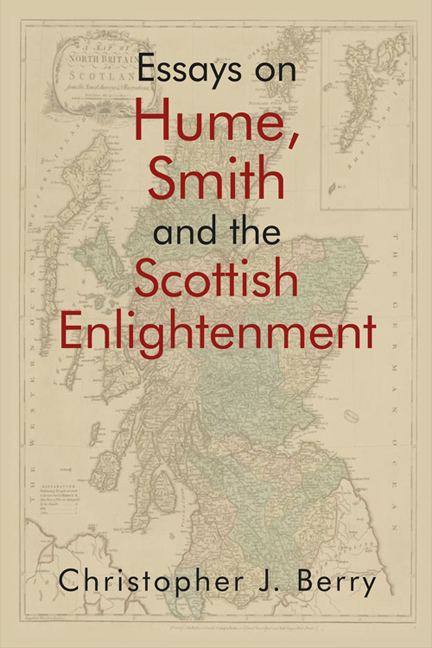11 - Hume and the Customary Causes of Industry, Knowledge and Humanity
Published online by Cambridge University Press: 06 May 2021
Summary
David Hume employs the phrase ‘industry, knowledge and humanity’ in his essay ‘Of Refinement in the Arts’ and, conjoined with that employment, are two claims. First, the links that connect these three are said to comprise an ‘indissoluble chain’; and second, these links are said to be ‘peculiar to the more polished, and, what are commonly denominated, the more luxurious ages’ (E-RA 271). I will say little about the first of these claims, about how this linkage characterises synchronically a commercial society. My focus, rather, is on an implication of the diachronic second claim. From this latter perspective, if this passage represents a terminus ad quem, then the terminus a quo is encapsulated in the phrase ‘ignorance, sloth and barbarism’ that Hume employs in the slightly later essay ‘Of the Jealousy of Trade’ (E-JT 328). If we juxtapose the two-word trios, we can discern a transition from ignorance to knowledge, from sloth to industry and from barbarism to humanity. These transitions can be expressed generically as going from a rude condition to a polished one, or from a savage, barbarous society to a civilised, luxurious one.
Clearly, for Hume, this transition represents an improvement. But what is it that improves? The answer is not human nature, but customs and manners. A single chapter precludes any lengthy discussion of the former negative point; accordingly, I here concentrate on the latter positive one. The aim, therefore, is to examine Hume's account of the history of civilisation, which he presents as a history of customs and manners. Aside from his ‘theory of money’ (understood generically), which has dominated the discussion of his work, the other context within which Hume is treated in the ‘history of economics’ is as an exemplar of a ‘historical’ perspective. It is this latter context that this discussion explores. More precisely, and given that Hume believes that the subject matter of ‘economics’ is amenable to scientific analysis, I focus on his employment of causal analysis. Hence my aim is directed at the basic or underlying principles of Hume's invocation of customs as causes that account for social change.
- Type
- Chapter
- Information
- Essays on Hume, Smith and the Scottish Enlightenment , pp. 184 - 207Publisher: Edinburgh University PressPrint publication year: 2018



